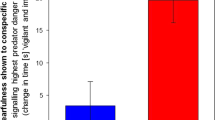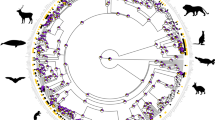Abstract
RECENTLY, attention has been directed at the question of how sexual imprinting, or the development of mating preferences, affects assortative mating within polymorphic species1–3 and regulates the extent of inbreeding and outbreeding in a population4–6. It may be selectively advantageous for a young organism to learn individual characteristics of parents and/or siblings to avoid subsequent mating with kin as well as to avoid hybridisation by not mating with individuals that differ greatly from rearing partners4–6. I report here that adult female zebra finches (Taeniopygia guttata) can recognise the song of their own father after a period of early exposure followed by more than 2 months of separation while attaining sexual maturity.
This is a preview of subscription content, access via your institution
Access options
Subscribe to this journal
Receive 51 print issues and online access
$199.00 per year
only $3.90 per issue
Buy this article
- Purchase on Springer Link
- Instant access to full article PDF
Prices may be subject to local taxes which are calculated during checkout
Similar content being viewed by others
References
Cooke, F., Mirsky, P. J. & Seiger, M. B. Can. J. Zool. 50, 529–536 (1972).
Cooke, F., Finney, G. H. & Rockwell, R. F. Behav. Genet. 6, 127–140 (1976).
Cooke, F. Z. Tierpsychol. 46, 344–358 (1978).
Bateson, P. Nature 273, 659–660 (1978).
Gilder, P. M. & Slater, P. J. B. Nature 274, 364–365 (1978).
Bateson, P. P. G. in Biological Determinants of Sexual Behaviour (ed. Hutchison, J. B.) 29–53 (Wiley, New York, 1978); Anim. Behav. (in the press).
Immelmann, K. Australian Finches, 143 (Angus and Robertson, Sydney, 1965).
Sossinka, R. Verh. Dtsch. Zool. Ges. 67, 344–347 (1974).
Immelmann, K. in Bird Vocalizations (ed. Hinde, R. A.) 61–74 (Cambridge University Press, London, 1969).
Price, P. H. J. comp. physiol. Psychol. 93, 260–277 (1979).
Miller, D. B. Anim. Behav. 27, 376–380 (1979).
Gottlieb, G. Development of Species Identification in Birds, 1–176 (University of Chicago Press, Chicago, 1971).
Heaton, M. B., Miller, D. B. & Goodwin, D. G. Devl Psychobiol. 11, 13–21 (1978).
Evans, R. M. Can. J. Zool. 51, 759–770 (1973).
Heinz, G. Anim. Behav. 21, 1–9 (1973).
King, A. P. & West, M. J. Science 195, 1002–1004 (1977).
Gottlieb, G. Psychol. Bull. 79, 362–372 (1973).
Vidal, J. M. Behaviour 52, 57–83 (1975).
Author information
Authors and Affiliations
Rights and permissions
About this article
Cite this article
MILLER, D. Long-term recognition of father's song by female zebra finches. Nature 280, 389–391 (1979). https://doi.org/10.1038/280389a0
Received:
Accepted:
Published:
Issue Date:
DOI: https://doi.org/10.1038/280389a0
This article is cited by
-
Song preferences predict the quality of vocal learning in zebra finches
Scientific Reports (2023)
-
Adding colour-realistic video images to audio playbacks increases stimulus engagement but does not enhance vocal learning in zebra finches
Animal Cognition (2022)
-
Meta-analytic evidence that animals rarely avoid inbreeding
Nature Ecology & Evolution (2021)
-
Recurrent development of song idiosyncrasy without auditory inputs in the canary, an open-ended vocal learner
Scientific Reports (2018)
-
Zebra finches identify individuals using vocal signatures unique to each call type
Nature Communications (2018)
Comments
By submitting a comment you agree to abide by our Terms and Community Guidelines. If you find something abusive or that does not comply with our terms or guidelines please flag it as inappropriate.



